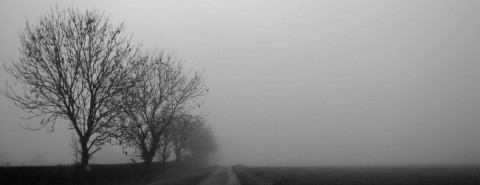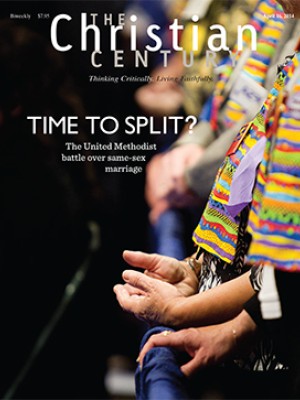Wilderness venture: Toward a more honest sermon
A few years ago, as a young Presbyterian minister, I started to get a lot of affirmation for my preaching. People were listening, worship attendance was growing, and I was overhearing parishioners describe me as a good preacher. Soon this shaped my pastoral identity and led me to claim preaching as my “thing.”
This prompted me to attend a large preaching conference, to learn from the best in my field. Getting lost in a massive sanctuary full of preachers was paradise for an introvert like me. I relished the anonymity—while also envying the preaching “great” in the pulpit. I wonder if I might ever be invited to be up there, I thought to myself but told no one.
Read our latest issue or browse back issues.
In fact, the only time I interacted with others was when the preacher forced me to. After a few of these “turn to your neighbor” conversations, I found a new pew: a single seat in the far stratosphere of the balcony, where no one was my neighbor.
Even from this isolated perch, I heard sermons that brought tears to my eyes. I took a lot of notes, and I left feeling inspired. But something was missing. It was so easy to hide there, to escape any real challenge. I attended the conference again the following year, but the problem remained. I came home with better ideas, but not a better preacher.
When I moved to Illinois for a new job as a college chaplain, my academic schedule prevented me from attending that conference again. Instead, I signed up for a couple of classes at the nearby Iowa Summer Writer’s Festival. I’d always loved to write. Maybe I’d even find a way to publish my sermons!
In Iowa City, I was a lone M.Div. in a sea of MFAs. I took two classes, one on free writing and one on “nonfiction for people with short attention spans.” I didn’t write sermons, but I did write about my faith. Others wrote about their childhoods, parenting, or the pain of death or divorce. We got to know each other intimately—especially since one of the unspoken rules was to check your ego at the door.
The first time I read my writing to the class, I reverted to my 13-year-old self. I giggled manically, smiled inappropriately, and sweated profusely. What I had written was terrible—stiff awkward sentences, filled with words like nice—yet I had to read it aloud and receive feedback.
After I finished, the teacher shared some advice: “If you find yourself writing bad stuff, try to write even worse.” Was I supposed to take that as encouragement?
By Wednesday I was in crisis. “I suck at this,” I texted to a pastor friend. “This is the hardest thing I have ever done.” I knew I was failing miserably. Everything I wrote was composed in fear, written to the expectations I assumed for myself as a pastor. I wrote stiff and safe.
My classmates responded with polite words, straining to encourage me. My teacher was ruthless. He was a brilliant poet; insightful, witty, extremely well read, and interested in religion—he’d grown up Jewish in New York City but found a home in Buddhism as an adult. When we sat down for our individual teaching session at a local coffee shop, I felt like I was meeting with my own edgy Buddha.
He began our conversation by confessing his envy. “You know, Teri, poets get really excited when ten people show up for one of our readings,” he said. “You have an audience larger than that every week.” Then, in a bit of a fury, he proceeded to rip apart the carefully crafted sermon that lay on the table in front of him—a sermon that I had shared as one of my best. His pen blocked off and slashed through whole paragraphs as “unnecessary.” He circled my “real beginning,” which I had mistakenly placed at the end.
Finally, in a frustrated huff, he just stopped, looked up at me, and said, “You’re not venturing far enough into the wilderness of humanity. You tiptoe in, but you don’t go far enough. Then you slap a Band-Aid on the end for a conclusion as if to make everything OK.” I sat there silently, not knowing what to say. I understood, but I didn’t. I knew I had work to do as a preacher.
My teacher’s words haunted me: you’re not venturing far enough into the wilderness. I began to search for models of wilderness writing. Everyone in Iowa City was drunk on poetry, so I started there. I already had works by Mary Oliver and Wendell Berry on my bookshelf; every pastor knows to quote those two. Upon the recommendation of my new literary friends, I began to read Douglas Goetsch, Marie Howe, Stephen Dunn, Mark Halliday, and Russell Edson. I discovered Christine Hemp and David Wright and rediscovered Sharon Olds. I stacked my arms with slim volumes and immersed myself not only in poetry, but in people—because as I read, I came to know these poets in deeply personal ways.
In fact, they stunned me with the ways they lay themselves bare on the page. When I read about their lives, I felt life. Never overly sentimental, never cliché, their sparse details and specificity lured me into their wilderness and their truth. Yet that wilderness is also a universal place, a human place. Marie Howe takes me there at the end of her poem “One of the Last Days”:
On one of the last days I told him, You know how much you love Joe?
That’s how much I love you. And he said, No. And I said, Yes.
And he said, No. And I said, You know it’s true.
And he closed his eyes for a minute.
When he opened them he said, Maybe you’d better start looking for somebody else.
As I read poems like these—poems that evoke such deep, universal emotions—something started to happen within me. A desire began to grow and gain strength: a desire to be more honest and free.
I started to write again—at first playfully, then with abandon. I wrote angry. I wrote questioning. I wrote silly. I swore a lot. I had no agenda for my writing, except to stop hiding and to follow the thread of inspiration—a thread that led me to stories and scenes and experiences of truth that didn’t exist until I intentionally gave myself the space and permission to go there.
It was liberating to write this way. It was also effective. My teacher finally smiled at me and said my words held wisdom. My classmates told me that if I wrote sermons like that, they’d come hear me preach.
I began to understand what people—myself included—are hungry to hear. Our hunger is for words that are real and honest, that evoke our deepest emotions, that name the wilderness in which we live and enlighten us to the truth that we are not alone there. My experience in Iowa helped me understand the importance of this wilderness. It also emboldened me to venture farther into it.
In other words, when I’m writing a sermon, I now pay more attention to myself. As I approach some piece of truth, I may feel myself growing anxious. I can’t tell this church’s members they are boring and lifeless, I tell myself, even though they are dying from their lack of vitality. I can’t leave Abraham’s sacrifice of Isaac unjustified, even though I’ve never been able to justify this story in my own mind. I can’t use the word ass in my prose poem, even though it’s the word that comes most naturally. When this anxiety comes, I’ve started willing myself forward anyway, so as not to lose the thread.
There’s a young man in my community, an evangelical whose face registers shock every time I preach. I’ve often felt compelled to present myself to him in a way that’s inauthentic. Now, I acknowledge his haunting presence and then move on. I can always edit later, I tell myself.
When my sermon is going nowhere, when I have nothing new to say, I ask myself what I am avoiding and why. I search for the heat of the scriptural text, the place where it rubs my heart into sparks of connection, the place of its most profound and frightening truth. Then I fan the flames to see where the Spirit takes me.
It’s a wild and frightening ride, this venture into the wilderness. But in this place of stark honesty, I am being led to my best self and my best preaching. I am being led to love my congregation—and the world—with words that matter.






